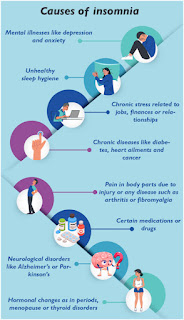Author : Dr. P. D.GUPTA
Former Director Grade Scientist, Centre for Cellular and Molecular Biology, Hyderabad, India
www.daylife.page
Sleep is the 4th essential commodity in support of life. The first is the air without which life cannot be sustained for a few minutes. The next is water cannot live without it a few days and the third one is food can mot live without it for a few weeks. Sleep is the fourth one without this cannot survive more than a month. All human being spend about one-third of his or her lifetime in sleep only. And it is essential too, without which it is difficult to manage our daily life. Although, it's unclear exactly how long humans can survive without sleep? The longest recorded time without sleep is approximately 264 hours, or just over 11 consecutive days.
Sleeping problems are common in people with intellectual disabilities or mental health problems, such as depression or schizophrenia. Sleeping difficulties are also common in many other disorders and illnesses, including Alzheimer's disease, stroke, cancer, and head injury. Lack of sleep results many disorders in the body. Not getting enough sleep can lower sex drive, weaken immune system, causes thinking tissues, and lead to weight gain. When enough sleep is not there, one may also increase the risk of certain cancers, diabetes, and even car accidents. Not only have these but cardiovascular diseases such as, high blood pressure, heart failure, coronary heart disease and stroke also set in.Among all cancer types, gastrointestinal (GI) cancers, especially colorectal type, seem to be one of the most relevant to an individual’s lifestyle; thus, they can be prevented by modifying behaviours most of the time. Previous studies have shown that disruption of the 24-h sleep–wake cycle increases the chance of colorectal cancer, which can be due to exposure to artificial light at night and some complex genetic and hormone-mediated mechanisms. We have described the ill effects of night light at length in the book “ Dark side of Night light” published in Germany, Available with Amezon, India. There has also been some evidence showing the possible associations between other aspects of sleep such as sleep duration or some sleep disorders and GI cancer risk.
There is a vicious interplay between disrupted sleep and malignant brain tumours. The malignant brain tumour patients experience sleep disruption. Disrupted sleep is known to have significant systemic pro-tumour effects, both in patients with other types of cancer and those with malignant brain lesions.
Indeed, it has been shown that disrupted sleep is one of the most common complaints in patients undergoing cancer treatment, with patients suffering from malignant brain tumours being especially susceptible. Furthermore, the risk of developing several different cancers can be directly correlated with various sleep disturbances. On the other hand, patients suffering from various types of neurological disorders very often also suffer from some sort of disrupted sleeping pattern. (The author has his own study and views)







